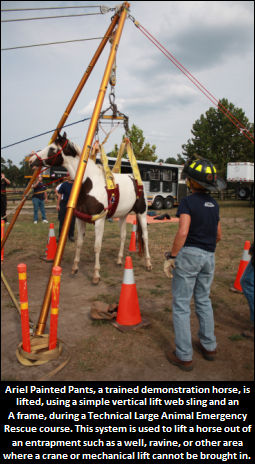A trailer loaded with livestock has overturned on a major highway. Some animals are trapped inside the badly damaged trailer, and others are wandering in the traffic. What is the safest way to handle this situation — for the animals and the people?
 Dr. Erica Koch, a veterinarian with the Ambulatory Equine Service at UPEI’s Atlantic Veterinary College, is keenly aware that emergencies involving large animals can happen any time anywhere. She is the driving force behind bringing a Technical Large Animal Emergency Rescue (TLAER™) course to AVC from July 5 to 7, 2012.
Dr. Erica Koch, a veterinarian with the Ambulatory Equine Service at UPEI’s Atlantic Veterinary College, is keenly aware that emergencies involving large animals can happen any time anywhere. She is the driving force behind bringing a Technical Large Animal Emergency Rescue (TLAER™) course to AVC from July 5 to 7, 2012.
Course instructors Dr. Tomas Gimenez and Dr. Rebecca Gimenez have taught TLAER™ across the US, and in the UK, Australia and Colombia, but this is the first time that they will teach it in Canada.
“TLAER™ is not disaster medicine, and it is not only field medicine,” says Dr. Tomas Gimenez. “Participants learn practical techniques for safely rescuing live large animals from entrapment situations like trailer wrecks, ditches, mud pits, and barn fires.”
Koch took the course in 2008 while she was doing a large animal residency at the University of Pennsylvania.
Large animal veterinarians often have to deal with livestock and horses that go down because of injury, illness or accident, says Koch. As clinicians, they have to be prepared for all kinds of emergency situations, small and large.
“TLAER™ is a great course,” she says. “You learn about preparing for situations of all kinds — from helping a horse that has fallen in its stall to dealing with animals caught in large-scale disasters like hurricanes or floods.”
The course is not just for large animal veterinarians and technicians, she says. It is designed for emergency responders such as firefighters, police and rescue teams, as well as animal rescue organizations, and large animal owners and transporters.
Koch says the course also includes education about animal behaviour, which is important for non-veterinary emergency responders.
“Large animals like horses and cattle are ‘flight’ animals,” she says. “A responder may not know that horses rescued from a burning barn may try to run back into it. To the horses, the barn is their ‘safe’ place even though it’s on fire.”
The course instructors use animals that are specifically trained for the TLAER™ course to demonstrate rescue techniques used in a variety of emergency situations. While the course primarily covers livestock and horses, the techniques are applicable to emergency situations involving zoo and exotic animals, and commercial livestock, and animal cruelty investigations.
For information about the TLAER™ course at AVC, please contact Dr. Erica Koch at 902-393-6104 or [email protected]. Registration information is available at upei.ca/avc.

